A Psychological Profile on 3 Types of Permissive Parents
In this article on permissive parents, you'll:
• Discover the true essence of indulgent parenting: That it's not about lack of control as such but about personal fear!
• Be introduced to the concept of the 'ego' in order to understand what are ego fears!
• Get a description of 3 types of permissive parents (the Friendly Helper, the Enthusiastic Adventurer and the Mediating Peacemaker)
• Be given a psychological understanding of the basic ego fear of each of these 3 indulgent parenting types!
The Good Virtues of Permissive Parents
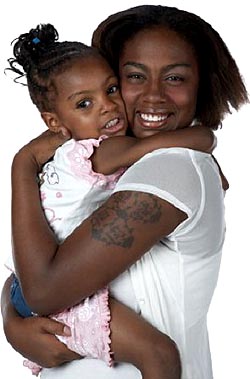
According to Diana Baumrind, the developmental psychologist who back in the 1960s coined the 'permissive parenting style', parents who are permissive are loving, empathic and accepting.
Diana Baumrind considered these good human virtues that are vital in having a healthy child parent relationship.
So, as this is all good ... what's wrong then?
Why do permissive parents often find parenting such a challenge?
Permissive Parents' Challenge According to Diana Baumrind:
- "Demandingness" is too Low!
Diana Baumrind operated with a two factor model. When she was trying define typical white middleclass parenting styles (of which she found 3) she isolated two behavioral continuums - responsiveness and demandingness - that differed within the different parenting styles. As indirectly stated in the previous section, parents who are permissive score high on responsiveness with their loving and affectionate attitude.
However, they score low on demandingness. Another word for demandingness could be control or discipline. And a low level of demandingness was considered less fortunate by Baumrind.
Parents who are permissive are non-punitive, have very few standards and rules, encourage communication and involve their child in family decisions.
According to Diana Baumrind and other later researchers, children of parents who are permissive tend have high self esteem, good social skills but are also prone to be more involved in problematic juvenile behavior such as drug or alcohol use.
A typical more public or layman opinion of children of permissive parents is that because kids of parents who are permissive get every need and want satisfied, they tend to become spoilt and bossy oblivious of other people's needs.
These are the common scientific and layman views on permissive parents.
Now, I don't agree with Diana Baumrind's celebration of control as being the ultimate answer to handling conflicts or disobedience.
I find it too simple an answer.
The problem is not control!
Lack of control is just an expression of the main problem which is ... fear!
(Read more about the problem of using demandingness as a measuring tool here in this article on the permissive parenting style.)
What Is Fear:
- An Ego Defence Mechanism!
Everybody, parents, teachers, me, you ... we all have behavior patterns, convictions and beliefs that make us do things that are counter to what we all actually want, namely being happy!
So what is it that drives these actions and mental strategies?
It's our ego!
The ego is a fear-based survival mechanism.
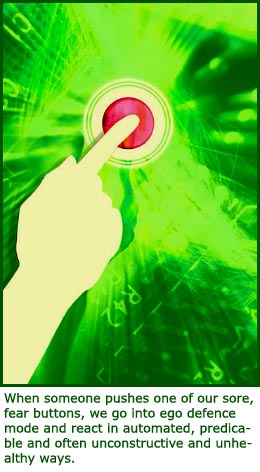
It's that small part of us that particularly arises when we're unbalanced, stressed, tired, frustrated and scared.
All depending on our past personal experiences the ego makes us behave in an almost automated, predictable manner to help us survive, solve problems and fulfil our basic needs.
For instance, one of my own ego reactions is like this: If someone tells me what to do, you can be sure I will not do it. Even if what is 'demanded' is good for me, I will not do it if it's an order!
This is downright stupid, right?
But one of my basic fears which feeds my ego and make me do silly things that is the fear of being trapped or deprived of freedom.
Also I fear being under other people's control and being dependent on them. Do you see this in my above example?
This is the way the ego works. It makes us do silly things because of our existential fears.
We all have fears, they are just different from person to person.
However, the more you are aware of your fears and your patterns, the more you can work with them rather than just being an unconscious slave to them.
The personal development tool, the Enneagram is excellent in helping find your ego type and help you live a more conscious life with it.
Permissive Parents' Challenge According to Me:
- Parenting in a Fear-mode!
arents who are permissive also have ego fears and their parenting strategies reflect them. I have identified 3 ego fears that permissive parents may act from:
- The fear of not being loved, needed or wanted!
- The fear of losing freedom and being trapped in pain!
- The fear of loss and losing inner stability and peace of mind!
If you know the Enneagram, you'd recognize the basic fears of Enneagram type 2 (the Friendly Helper), 7 (the Enthusiastic Adventurer) and 9 (the Mediating Peacemaker).
According to the Enneagram, there are 9 universal personalities. Those I just mentioned are the ones that I see may have challenges with permissiveness.
(If you're curious to know which type you are, you can take the quiz here.)
The Friendly Helper:
- The Fear of Being Unloved, Unneeded and Unwanted!
Do you recognize this: 
"It's all about love": You see yourself as a selfless, loving and caring person that will go out of your way to help others and satisfy the needs of your loved ones - even when it comprises your own needs (and it often does).
You're warm and friendly and maintaining close relationships with the people you love is the most important thing in the world to you.
However, your basic fear of not being loved or being unwanted or 'unnecessary' / 'superfluous' , may result in permissive parenting patterns that may be a challenge for both you and your children.
Parenting Tips for the Friendly Helper!
- Every parent has to make various personal compromises because of their kids. You especially! Try to pay attention to when your children will manage by themselves and when they actually really need your help. Laying off sometimes will help your children feel the empowerment that lies in succeeding by oneself.
- Try to notice if you are sacrificing yourself because you're scared of the unpleasant feelings that may arise if say "no" or if you're 'giving in' because your child actually needs what he or she wants (read this parenting article to learn to distinguish between needs and wants).
- Saying "no" to your children is a real challenge. They get upset and that makes you unhappy. Deep down you might be afraid that if you say "no" it will damage your relationship. However, respecting yourself and your own limits will teach your children to respect you, too! Because if you don't respect yourself, why should your children.
- Showing your child lots of spontaneous love and affection is great, it helps your child create and positive self image and self love. Hold back on flattery and manipulation (bribes and gifts) - unconditional love is much more powerful.
The Enthusiastic Adventurer:
- The Fear of Being Trapped and Dependent!
Do you recognize this: 
"It's all about being free!" You're spontaneous, fun loving and optimistic. You love new ideas, have lots of projects on the go and are always on the lookout for new interesting experiences.
However, you also tend to be scatterbrained and easily become distracted which means you may have difficulties actually reaching all your many goals.
Rules are considered limiting for your freedom and boring for your brain and it's always an interesting intellectual task to find a way around them.
However, your basic fear of being trapped or dependent may result in permissive parenting patterns that may be a challenge for both you and your children.
Parenting Tips for the Enthusiastic Adventurer!
- Being a friend to your children is good, fantastic, but you need to be more than that. You don't like authorities and therefore you don't want to be one to your children. However, your children do need guidence. Try to consider yourself an empowering coach. Your wise being and knowledge will bring a great sense of security to your child.
- You might be reluctant to set limits and boundaries for your children because you're afraid it might hinder their creativity and free personal development. However, sometimes your child does need framework to feel secure - try not to project your own dislike for boundaries and fear of being trapped in boring routine onto your kid. Your needs are not necessarily the same as your kids' needs!
- Don't be scared of your own or your children's 'negative' emotions. They're just feelings, they can't hurt you. Stay present and accept them rather than ignoring them or trying to convert them into something that is fun!
The Mediating Peacemaker:
- The Fear of Loss and Losing Inner Stability and Peace of Mind!
Do you recognize this: 
"It's all about harmony!" You're easygoing, kind hearted and trusting. You really dislike disharmony and conflicts and you're often willing to go with the flow just to keep the 'happy' status quo.
You're able to see all sides in conflicts and this ability makes you a great mediator but also makes it difficult to make decisions.
These traits may make others think you're passive or lazy.
However, your basic fear of loss and losing inner stability, may result in permissive parenting patterns that may be a challenge for both you and your children.
Parenting Tips for the Mediating Peacemaker!
- You intensely dislike power struggles. However, you don't have to be on the same emotional page as your children. Just try to be present with all your attention and resist the temptation of zapping off into daydream mode when things become uncomfortable. This will only make your child cry out louder because he or she can't 'feel' you.
- Resist the temptation of just giving in to your child in order to avoid upsetting family harmony. Try to see if you can spot your child's need (e.g. attention, presence, respect etc.) and give your child that. Your child's need may be different from what your child thinks he or she wants.
- Because you so easily identify with your children's agendas, it's so difficult saying no because you understand them so well. Practice finding your own voice. Your voice matters - to you and to your children.
The Last Point on Permissiveness!
As you can see from all the ego strategies mentioned above, when you follow your old patterns of fear, you tend to miss seeing what your children really need.Even if your ego disguises what you're doing as being selfless, freedom inspired or harmony orientated.
These strategies are not necessarily helping your child but only meeting old established needs in yourself.
Becoming aware of these patterns will raise your parenting awareness and help you avoid the pitfalls of permissive parenting (thinking you're meeting your children's needs when what you are actually doing is being on self need autopilot).
If you're interested in more articles on permissive parents and other parenting styles, you are very welcome to follow the links below.
Your Positive Parenting Ally,
Birgitte

Want to stay in touch and get the latest news?
Sign up
for my free newsletter
Parent Coaching
- For Inner Peace, Clarity and a Deeper Connection to Your Child
 Being a parent can feel like a double-edged sword. Life with kids may feel like the greatest gift you have ever received, while at the same being hugely challenging, often leaving you confused, stressed and overwhelmed.
Being a parent can feel like a double-edged sword. Life with kids may feel like the greatest gift you have ever received, while at the same being hugely challenging, often leaving you confused, stressed and overwhelmed.
When we feel like this, we've lost touch with ourselves. We can't hear our own inner voice, and it's difficult to know what is 'right' for us and how to act.
I offer in-depth parent coaching to help you regain your balance and get back in touch with yourself. From a place of inner peace and clarity, your will find your own answers which will help you reconnect with your child from a place of unconditional love and acceptance.
Read more about my parent coaching here.
Where Would You Like to Go Next?
Go to the 'Mother Page' of These Parenting Articles
 Tracing Diana Baumrind's Parenting Styles Through History! Unravelling the Essence of the Dominant Parenting Paradigms of the Western World |
Articles on Diana Baumrind's 3 Parenting Styles
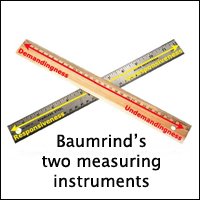 Diana Baumrind's 3 Styles of Parenting: Get a Full Understanding of Baumrind's 3 Archetypical Parents. |
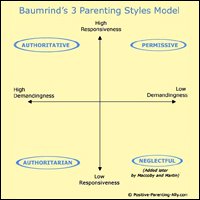 The Four Basic Styles of Parenting Taken a Step Further: Reviewing Diana Baumrind's Model with the Tool of High Awareness. |
Articles on the Authoritarian Parenting Style
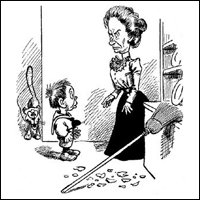 A Fascinating Historical View on the Authoritarian Parenting Style Along with Deep Insights into Authoritarian Parents' Thought Pattern and Its Effect on Their Kids. |
 A Psychological Profile on Authoritarian Parents! Understanding the Authoritarian Personality from Within! |
 The Essence of the Authoritarian Parenting Style and the Long Term Effects of Strict Parenting! |
Articles on the Permissive Parenting Style
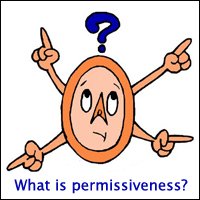 Permissive Parenting Historically and Psychologically: The Rise of 'Permissive' Parenting and the 3 Fear Based Indulgent Parenting Strategies! |
 The Permissive Parenting Style Seen in an Existential Light. The Beingness of Permissive Parenting vs. the Beingness of Positive, Unconditional Parenting! |
 Understanding the nature of the permissive parenting style: Going beyond Diana Baumrind's idea of low demandingness and get deep insights into the psychology of permissive parents. |
Articles on the Authoritative Parenting Style
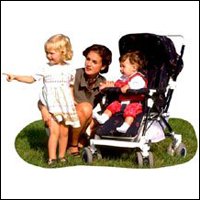 Deep Insights into the Authoritative Parenting Style along with Modern Perspectives on Diana Baumrind's Beloved 'Firm Parental Control'! |
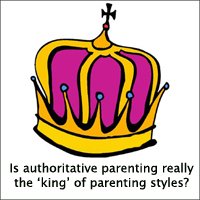 Academic Criticism of the Authoritative Parenting Style: Questioning Diana Baumrind's Celebration of High Control! |
Back to the top of this page about A Psychological Profile on 3 Types of Permissive Parents
Go to the Positive Parenting Ally Homepage







